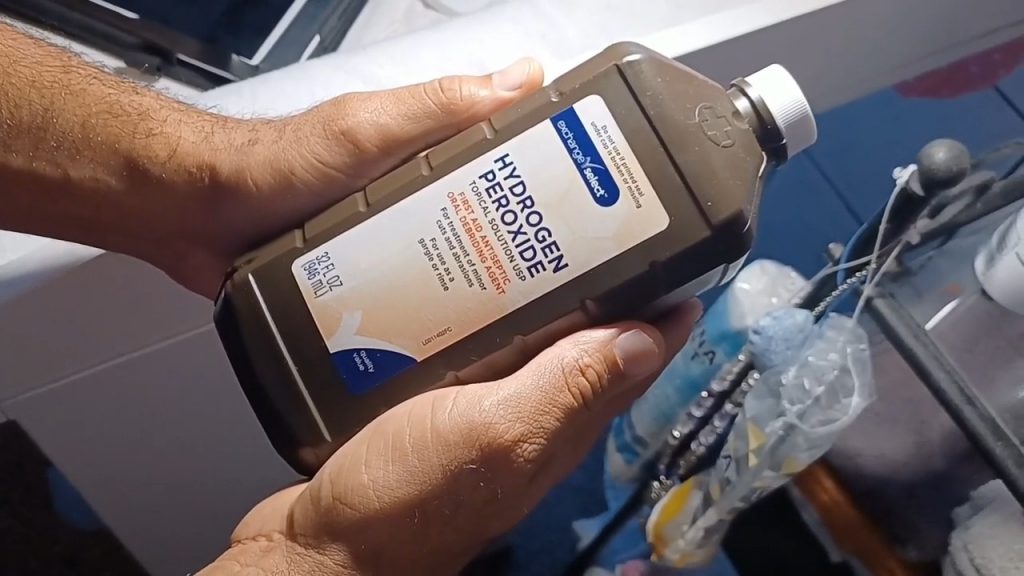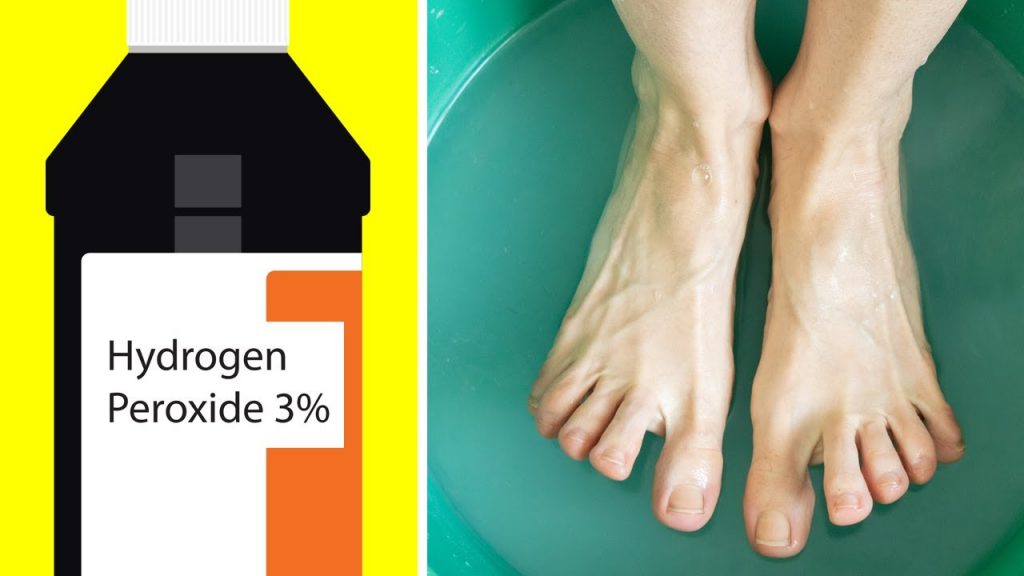If you’re searching for alternative ways to manage psoriasis, hydrogen peroxide might have caught your attention. While it’s commonly known for its disinfecting properties, hydrogen peroxide can also offer potential relief for psoriasis symptoms when used correctly.
Let’s explore three effective ways to incorporate hydrogen peroxide into your skincare routine to help soothe flare-ups and manage your condition safely.

What Is Hydrogen Peroxide?
Hydrogen peroxide (H₂O₂) is a chemical compound made up of hydrogen and oxygen. It’s a clear, colorless liquid commonly used as a disinfectant and antiseptic. In lower concentrations (such as 3%), it’s often found in first-aid kits for cleaning minor cuts, scrapes, and wounds.
Its oxidizing properties make it effective at killing bacteria, viruses, and fungi by breaking down their cell walls. Beyond medical uses, hydrogen peroxide is also used in household cleaning, teeth whitening, and hair bleaching. However, it must be used with caution, as improper use can cause skin irritation or damage.
How Does Hydrogen Peroxide Help Psoriasis?
Hydrogen peroxide may help with psoriasis by offering its antiseptic and anti-inflammatory properties, though its effectiveness can vary. Here’s how it might work:
- Disinfectant Properties: Hydrogen peroxide can help clean and disinfect psoriasis-affected skin, reducing the risk of infections in areas with open sores or cracks caused by the condition.
- Oxygenation of Skin Cells: When applied, hydrogen peroxide releases oxygen, which may help reduce inflammation and promote healing in psoriasis plaques. This oxygenation can potentially help in reducing the buildup of dead skin cells, a common symptom of psoriasis.
- Drying Effect: Hydrogen peroxide has a drying effect, which might help reduce excessive moisture in the skin, improving the appearance of scaly patches. However, this drying effect could also worsen psoriasis in some cases, as dry skin can lead to more irritation.
It’s important to note that while hydrogen peroxide might offer some short-term relief for psoriasis symptoms, it is not a cure. Its use should be approached cautiously, as overuse or high concentrations could irritate the skin or lead to further complications.
Benefits of Using Hydrogen Peroxide for Psoriasis
Hydrogen peroxide, when used appropriately, can offer several benefits for managing psoriasis symptoms. Here’s how it can help:
1. Disinfectant and Antiseptic Action
Hydrogen peroxide is a well-known disinfectant. When applied to psoriasis-affected areas at a low concentration (3%), it helps clean and disinfect the skin, reducing the risk of infections caused by open sores or scratching. This can be especially helpful for psoriasis patches that become irritated or broken, acting as a first line of defense against infections.
2. Eliminates Free Radicals and Germs
Hydrogen peroxide works by releasing oxygen, which helps neutralize free radicals and kill germs. This can be particularly useful for treating scalp psoriasis, allowing for targeted treatment in specific areas without having to apply it across the entire scalp. However, be mindful of its potential bleaching effect on hair.
3. Improves Nail Psoriasis
For those with “nail psoriasis,” hydrogen peroxide can help improve the appearance and health of affected nails. It can reduce yellowing and restore the nails’ natural color while also killing bacteria and fungi that might infect weakened nails. This can lead to stronger, healthier-looking nails over time.
4. Foot Psoriasis Treatment
Hydrogen peroxide mixed with distilled water can be an effective remedy for foot psoriasis. Soaking the feet in this solution helps treat hard-to-reach areas, such as under the nails and between the toes. Its antifungal properties can reduce infections and promote healthier skin and nails, offering fast relief in just a few minutes of soaking.
By using hydrogen peroxide correctly, it can serve as a helpful addition to your psoriasis management routine, providing relief from irritation, infection, and discomfort.
How to Use Hydrogen Peroxide in Psoriasis?
Hydrogen peroxide can be used as a complementary treatment for psoriasis, but it’s important to follow proper guidelines to ensure safety and effectiveness. Here’s a step-by-step guide on how to use it:
1. Diluted Application for Skin Psoriasis
- What you need: A 3% hydrogen peroxide solution and distilled water.
- How to use:
- Mix equal parts of hydrogen peroxide (3%) and distilled water.
- Using a cotton ball, gently dab the solution onto the affected areas of your skin.
- Let it sit for a few minutes before rinsing off with cool water.
- Frequency: Use once or twice a day, but avoid overuse to prevent skin irritation or excessive dryness.
2. Targeted Treatment for Scalp Psoriasis
- What you need: 3% hydrogen peroxide, distilled water, and a spray bottle.
- How to use:
- Dilute the hydrogen peroxide by mixing one part hydrogen peroxide with two parts distilled water.
- Pour the solution into a spray bottle.
- Spray directly on the psoriasis-affected areas of the scalp, avoiding healthy hair as hydrogen peroxide can bleach it.
- Leave it on for a few minutes before rinsing thoroughly with cool water.
- Frequency: Apply a few times a week, depending on the severity of the psoriasis.
3. Foot Soak for Psoriasis
- What you need: A 3% hydrogen peroxide solution, distilled water, and a basin for soaking.
- How to use:
- Mix one part hydrogen peroxide with two parts distilled water in a basin.
- Submerge your feet in the solution for about 5 minutes.
- After soaking, dry your feet thoroughly and apply a moisturizer to prevent dryness.
- Frequency: This can be done 2–3 times a week, but adjust based on how your skin reacts.

4. Nail Psoriasis Treatment
- What you need: 3% hydrogen peroxide, a small bowl, and distilled water.
- How to use:
- Mix equal parts hydrogen peroxide and distilled water in a small bowl.
- Soak your nails in the solution for 5 minutes.
- Rinse with water and moisturize afterward.
- Frequency: Use once daily until you see improvement in nail color and health.
Safety Tips:
- Patch Test: Before applying hydrogen peroxide to large areas, do a patch test on a small part of your skin to check for any adverse reactions.
- Avoid Sensitive Areas: Keep hydrogen peroxide away from mucous membranes, eyes, or broken skin.
- Moisturize: Hydrogen peroxide can dry out your skin, so follow up with a moisturizer to maintain skin hydration.
- Consult a Doctor: Always consult with a healthcare professional before starting any new psoriasis treatment to ensure it’s safe for your condition.
Using hydrogen peroxide cautiously and in the right concentrations can help manage psoriasis symptoms, but it should not replace medical treatments prescribed by your healthcare provider.
Side Effects of Hydrogen Peroxide on Psoriasis
Hydrogen peroxide can cause side effects when used on the skin, such as irritation, dryness, peeling, and, in higher concentrations, burns or blistering. Prolonged use may lead to skin discoloration or delayed wound healing. On the scalp, it can bleach hair, and accidental contact with eyes can cause damage.
Some people may also experience allergic reactions. While it can help clean wounds, its strong oxidizing effect may harm healthy tissue, increasing the risk of infection if overused. Always use a 3% solution and consult a healthcare professional for safe use.
Cautions to Have When Using Hydrogen Peroxide on Psoriasis
When using hydrogen peroxide on psoriasis, it’s essential to exercise caution to avoid worsening the condition or causing additional skin issues. Here are some important cautions to keep in mind:
1. Use the Correct Concentration
- Only use a 3% hydrogen peroxide solution, as higher concentrations can cause burns, irritation, or damage to healthy skin. Dilute if necessary.
2. Limit Application to Affected Areas
- Apply hydrogen peroxide only to psoriasis-affected areas, avoiding healthy skin. This helps prevent irritation and unwanted side effects such as dryness or peeling.
3. Avoid Prolonged Use
- Long-term or frequent use of hydrogen peroxide can damage skin cells and delay healing. It should only be used short-term for relief, not as a permanent solution for psoriasis management.
4. Patch Test First
- Before applying hydrogen peroxide to larger areas, conduct a patch test on a small portion of the skin to check for adverse reactions like redness, stinging, or excessive dryness.
5. Moisturize After Use
- Hydrogen peroxide can dry out the skin, which may worsen psoriasis. After using it, apply a gentle, non-irritating moisturizer to maintain skin hydration and prevent further irritation.
6. Avoid Sensitive Areas
- Do not use hydrogen peroxide on sensitive areas, such as around the eyes, mouth, or on broken or inflamed skin, as this can lead to severe irritation or damage.
7. Consult a Healthcare Professional
- Always consult a healthcare provider before using hydrogen peroxide as a treatment for psoriasis, particularly if your condition is severe or you are using other medications.
8. Be Aware of Bleaching Effect
- If using hydrogen peroxide on the scalp, avoid contact with healthy hair, as it can bleach hair and cause uneven coloring.
9. Avoid Use on Open Wounds
- While hydrogen peroxide is often used to disinfect cuts, using it on open psoriasis sores or wounds may damage healthy skin tissue and delay healing.
By following these precautions, you can minimize the risk of side effects and ensure that hydrogen peroxide is used safely and effectively as part of your psoriasis care routine.